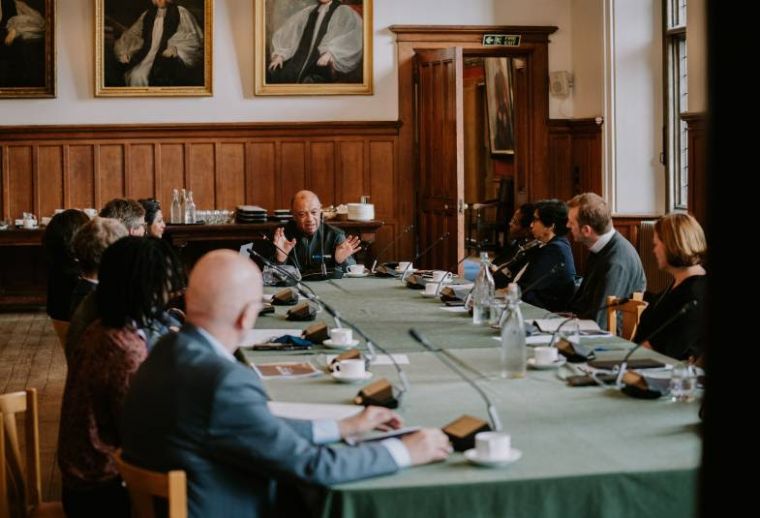Guidance on slavery monuments needs to be 'urgently reviewed', CofE told

How to deal with monuments linked to the slave trade is an "urgent and pressing matter that needs to be addressed if the Church of England is to fulfil its primary purpose of saving souls and witnessing to the all-embracing love of Jesus Christ for humanity", the Church of England has been told.
The warning came from Lord Boateng in the first biannual report of the Archbishops' Commission for Racial Justice, published today.
Lord Boateng, Commission Chair, said that the monuments were "a source of great hurt to many, and, for some, an obstacle to the worship of the risen Christ".
"The guidance on the subject is inadequate and incomplete, laying insufficient emphasis on the need to assess and form a view of the obstacle that is presented to Christian worship, firstly, by the impact of items in this category on the communities most affected by them, and, secondly, the views of the clerical and lay authorities responsible for the places of worship concerned," he said.
He went on to say that the consistory court process by which decisions are made around the removal of these monuments "is itself wanting in a number of respects and is also prohibitively expensive".
"Steps need to be taken to reform and simplify it," he said.
"Active consideration should be given to permit access to some form of financial assistance, where necessary, to parties with a legitimate interest to be heard, who would otherwise be unable to be represented by reason of the costs incurred.
"The legally qualified persons appointed to sit as chancellors and therefore act as judges in consistory courts should be drawn from a more ethnically diverse pool than is currently the case.
"Steps should be taken to identify and recruit a more diverse panel of judges, and practitioners qualified to practice in ecclesiastical courts. The chancellors appointed should also receive diversity training on a par with that provided to all judges in the secular courts."
Elsewhere, the report notes increasing calls for reparations internationally, and welcomes an ongoing "forensic exercise in accounting" to ascertain the extent to which the Church of England benefitted financially from "this monstrous imposition of human suffering".
"The issue of reparations and redress for past injustices and the losses incurred by the victims of the slave trade and their descendants is one of growing international significance, particularly in the Caribbean where the call is increasingly to the fore," the report reads.
"The Church of England cannot expect to be exempted from scrutiny in relation to its response to this call from closer to home."
It adds, "The Church's culpability regarding this issue is far more than that which can be calculated in economic terms.
"The harm done to the psychology of generations and to the moral underpinning of the Church as an institution is not readily quantified and is in some ways beyond measure.
"This is an area which will be of on-going interest for the Commission and to which we will return when the Church Commissioners publish the results of their work."
The Commission estimates that at least £20m needs to be invested to deliver on "From Lament to Action", last year's report from the Archbishops' Anti-Racism Taskforce which called for an urgent culture shift within the Church.
"Such a ring-fenced sum, however, is not meant to be a substitute for ensuring that racial justice is integrated into all the various funding streams of the Church of England," the Commission adds.
The Commission headed by Lord Boateng is charged with monitoring, holding to account and supporting the implementation of the 47 recommendations in "From Lament to Action".
"This is a painful process, and necessarily so, in that the response to an examination of racism and the exposure of injustice is often one of denial and defensiveness or obscuration and delay. This must not go unchallenged," he said.
The Commission plans to release a second report by the end of 2022 and two a year thereafter until the conclusion of its work in October 2024 when a final report will be published.
Commenting on the first report, the Archbishop of Canterbury, Justin Welby, said: "We strongly welcome the first report of the Commission on Racial Justice and the clear, independent scrutiny it provides.
"I am very grateful to Lord Boateng and his Commission members for the work they have done so far.
"This report identifies the difficult and long path to eradicating the pain and injustice felt by so many, but provides us with hope that through the Commission's work, these issues will be addressed."
The Archbishop of York, Stephen Cottrell added: "We are encouraged to see the work of the Commission in challenging current practice and stimulating culture change in the Church of England.
"It is important for us to engage with these ideas and continue to build both support and action.
"This reminds us that justice lies at the heart of the Gospels and it is our hope that the whole Church will be inspired to commit in earnest to this transformation."











